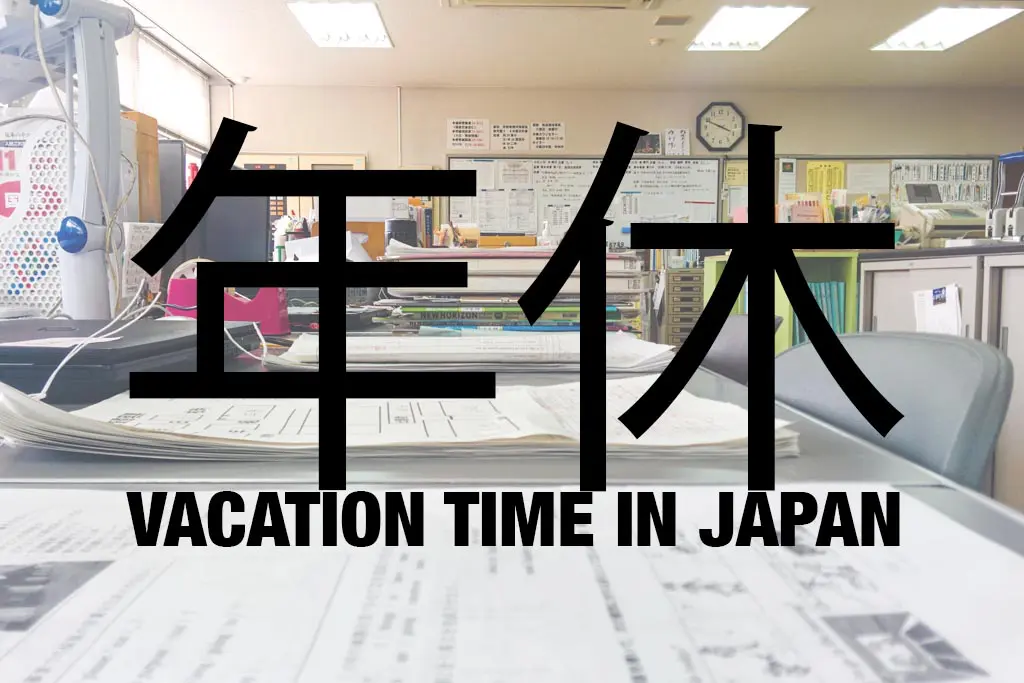How Vacation Time (年休 Nenkyu) Works In Japan
I used to think the United States had problems with vacation time from work (“I still do, but I used to too” -MH).
Now that I have experienced Japan’s approach to vacation time, or 年休 (nenkyu), I realize that things could be far worse in the United States.
Now, before you go on to read (and become infuriated), know that the scope of my expertise in this area is limited to my own experience: the observations of a foreign teacher in a public Japanese middle school (junior high school) in Fukui Prefecture.

Let’s say you want to take a vacation. Great! Let’s see how much vacation time you’ve got. Ten days? Fantastic! That’s sixteen days when you include weekends. Plenty of time to get away from work and forget that you’re trapped in a sad and terrible place.
But you’re a teacher in Japan, you can’t just take time off. That’s alright though, because you’ll make up for it when you get all of summer, winter, and spring vacations off. No you won’t. During breaks when class isn’t in session you are still required to be at work doing teacher things (like staring blankly into a computer screen – or tirelessly working on your blog).
Instead of using their vacation time for actual vacations, Japanese teachers use their vacation time hours, or even minutes, at a time (as opposed to taking days off). For example, I am currently looking at the corner of a staff room whiteboard that I just realized is for listing which teachers are taking vacation time and for how long (because you must be shamed for missing work).
So, what does this board currently say?
- TEACHER 1: 1 day
- TEACHER 2: 2 hours
- TEACHER 3: 4 hours
- TEACHER 4: 3 hours 45 minutes
Wait, what? Two hours? Four hours? Three hours and forty-five minutes?
What were these times on the board for again? Vacation time? Three hours and forty-five minutes of vacation time? Yes, three hours and forty-five minutes of vacation time. Why? Well, that’s a complicated question.

You see, teachers in Japan generally arrive at work before eight each day (how long before eight, I am not sure since I have yet to arrive more than fifteen minutes early) and stay until into the evening (until eight, nine, or later – I suspect some stay the night).
Apparently, teacher working hours officially end much earlier than this (at four?), but teachers “volunteer” their time beyond what is asked of them in their contracts to stay and assist with the school’s various club activities and sports teams (I LIKE SOCCER / I WANT TO BE A SOCCER PLAYER / SOCCER IS ENJOY). Many teachers also work at least one day each weekend with their extracurricular activity (if not both days).
This means that teachers don’t have time to go to the bank, visit the post office, see their doctor, or take care of their children. So, how do they make time for these things? They use vacation time, of course!
That’s right. Vacation time (for teachers) in Japan basically exists to allow them to miss work only when they absolutely have to (e.g., to take their child to the hospital or go to the dentist). The vacation time allotted to teachers in Japan is more of a bureaucratic loophole for missing work than an actual attempt at allowing time off.

Here are some examples of times it would be acceptable to use vacation time:
- The students all have a half-day and go home at noon. You may use a half-day of vacation time to leave at noon in lieu of sitting in the office the rest of the day.
- The internet installers are coming to your house at three. You may use an hour of vacation time to meet them and allow them to install your internet.
- Your mother is coming to visit you and needs a ride from the train station to your house at one. You may use an hour of vacation time to pick her up and take her to your home before returning to work.
- It’s spring/summer/winter break, and there are no classes. Vacation time may be used to avoid coming in and doing nothing all day.
This is in no way an exaggeration or misrepresentation of how nenkyu 年休 is used in Japan (that means vacation time if you haven’t been paying attention). Teachers can basically only use it during times they wouldn’t otherwise be working (but would still have to be at school because of “working hours”).
So, if you’re thinking about applying to the JET Programme and coming to “educate” Japan’s youth into speaking your native language, remember that you will be entering a strange and irrational world where logic and reason are axed in favor of strict adherence to rules no matter the circumstance.







Came across this while doing research on how to get 10 days of nenkyuu approved . Seems like absolutely nothing has changed in almost 10 years.
I wish you the best of luck. The strategy is not to let them set the precedent and to Gaijin smash it.
Don’t let this get you down. This isn’t exactly always the case with the JET programme. While it is correct that taking leave during school is generally frowned upon, using a few days at either end of a long weekend is definitely possible if you want an extended break. Also, we have a little bit more leniency being foreigners in Japan so don’t let it worry you too much.
Haha thanks for the encouragement. I’ve already left JET, but really enjoyed Japan (and my students) – just not JET.
I guess working as a tattooer in Tokyo still beats teaching ;) Taking the weekend off to hike Chougatake :) (and secretly test my first gear pieces for a possible PCT).
Let me know if you’re hiking in the area Tokyo – Yokohama – Ome – Takao, maybe I can give tips (even though I’m not that experienced here either)
I don’t know if I will be over there soon since I’ve been hitting the Kita Alps, but I would love to hear some of your favorite peaks in the region if you’ve come across anything worthwhile.
I’ve hiked Chougatake, ascending from the Matsumoto side (not the more touristy, crowded Kamikochi side) in the kita alps this last weekend and found it quite worthwhile! Great starry sky when camping on mountain top and a view of Yari etc.